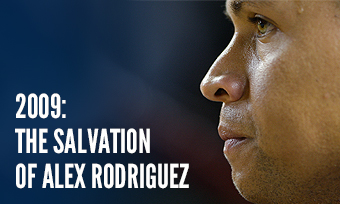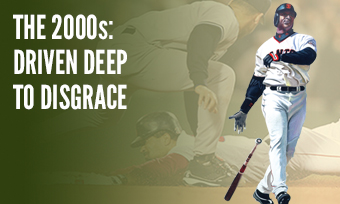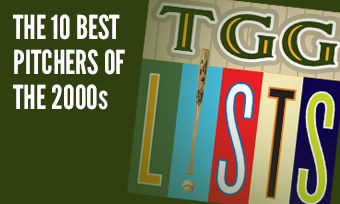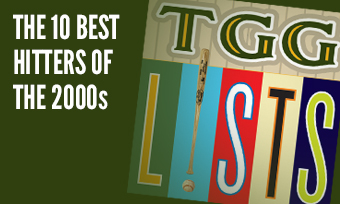The Yearly Reader
Leaders and Honors, 2009
Our list of baseball’s top 10 hitters and pitchers in both the American League and National League for the 2009 baseball season, as well as the awards and honors given to the game’s top achievers of the year.
The National League’s Top 10 Hitters, 2009
Bold type in brick red indicates league leader.
1. Albert Pujols, St. Louis
Key Numbers: .327 average, 124 runs, 186 hits, 45 doubles, 47 home runs, 135 RBIs, 115 walks, 44 intentional walks, 16 stolen bases, 23 grounded into double plays, .443 on-base percentage, .658 slugging percentage.
Pujols finished a prodigious decade in which he hit over .300 with at least 30 homers and 100 RBIs in every year except 2000—a year in which he had yet to reach the majors. If that’s not hard to believe, then there’s this: 2009 was the first season in which Pujols led the NL in home runs. Finally; he set a Cardinals record with five grand slams.
2. Prince Fielder, Milwaukee
Key Numbers: 162 games, .299 average, 103 runs, 177 hits, 35 doubles, 46 home runs, 141 RBIs, 110 walks, 21 intentional walks.
The Brewers’ boomer began a five-year stretch in which he played all 162 games in every season but one—when he logged 161. Even when there was a break, he didn’t take it off—winning the Home Run Derby.
3. Ryan Howard, Philadelphia
Key Numbers: .279 average, 105 runs, 172 hits, 37 doubles, 45 home runs, 141 RBIs.
Howard finished a monstrous four-year run averaging 50 homers and 143 RBIs, insisting he did it clean while embracing the fad of the moment, mouthguards—which allegedly improved muscular activity and oxygen flow throughout the body.
4. Ryan Braun, Milwaukee
Key Numbers: .320 average, 113 runs, 203 hits, 39 doubles, 6 triples, 32 home runs, 114 RBIs, 13 hit-by-pitches, 20 stolen bases.
Braun evolved with Prince Fielder into, arguably, baseball’s best one-two punch at the plate.
5. Hanley Ramirez, Florida
Key Numbers: .342 average, 101 runs, 197 hits, 42 doubles, 24 home runs, 106 RBIs, 27 stolen bases.
Amazingly, Manny Ramirez may not have been the most difficult Ramirez to deal with in 2009; Hanley nearly bolted from spring camp as the Marlins instituted a ban on long hair and jewelry, and later got in into a clubhouse tussle with teammate Dan Uggla over Hanley’s alleged dogging it. You would never know it from the numbers.
6. Derrek Lee, Chicago
Key Numbers: .306 average, 91 runs, 36 doubles, 35 home runs, 111 RBIs.
The 34-year-old Lee refreshed to 2005 near-triple crown level, belting 24 of his 35 homers over the seasons’ final three months.
7. Chase Utley, Philadelphia
Key Numbers: .282 average, 112 runs, 28 doubles, 31 home runs, 93 RBIs, 88 walks, 24 hit-by-pitches, 23 stolen bases, 0 caught stealing.
By blasting over 30 home runs for the third and final time in his career, Utley joined three other Phillies (Ryan Howard, Raul Ibanez and Jayson Werth) who also collected 30-plus.
8. Joey Votto, Cincinnati
Key Numbers: 131 games, .322 average, 82 runs, 38 doubles, 25 home runs, 84 RBIs.
Votto’s second full year might have been better than it already was, had it not been for a three-week absence in early June—first publicly reported as being due to a lingering ear infection. He revealed it was really a grieving period for his recently-passed father.
9. Ryan Zimmerman, Washington
Key Numbers: .292 average, 110 runs, 178 hits, 37 doubles, 33 home runs, 106 RBIs, 22 grounded into double plays.
Buoyed by a 30-game hitting streak, Ryan Zimmerman cemented his reputation as the Nationals’ first star hitter.
10. Adrian Gonzalez, San Diego
Key Numbers: .277 average, 90 runs, 27 doubles, 40 home runs, 99 RBIs, 119 walks, 22 intentional walks, 23 grounded into double plays.
The home-grown first baseman certainly would have been the first player to raise his hand toward approval of bringing in the fences at voluminous Petco Park; he hit only .244 with 12 of his 40 home runs there.
The American League’s Top 10 Hitters, 2009
1. Joe Mauer, Minnesota
Key Numbers: 138 games, .365 average, 94 runs, 191 hits, 30 doubles, 28 home runs, 96 RBIs, .444 on-base percentage, .587 slugging percentage.
A St. Paul native who immensely popular with Twins fans, Mauer registered the highest batting average ever by a catcher—but it was his power surge that caught most everyone’s attention; he would never hit more than 13 in any other season.
2. Jason Bay, Boston
Key Numbers: .267 average, 103 runs, 29 doubles, 36 home runs, 119 RBIs, 94 walks, 13 stolen bases.
Far quitter and better behaved than Manny Ramirez—whom the Red Sox traded away to get Bay as part of a complicated three-team deal in mid-2008—the former Pirates slugger gave his new teammates both solace and solid stats.
3. Mark Teixeira, New York
Key Numbers: .292 average, 103 runs, 178 hits, 43 doubles, 39 home runs, 122 RBIs, 81 walks, 12 hit-by-pitches.
Teixeira was might over marquee, driving the Yankees to a championship while bigger names took most of the glory.
4. Kevin Youkilis, Boston
Key Numbers: 136 games, .305 average, 99 runs, 36 doubles, 27 home runs, 94 RBIs, 16 hit-by-pitches.
Youkilis proved utter consistency with the following home run/RBI splits in his six full months of the 2009 season: 5/15, 4/16, 4/14, 5/16, 4/16, and 5/14.
5. Adam Lind, Toronto
Key Numbers: .305 average, 93 runs, 179 hits, 46 doubles, 35 home runs, 114 RBIs.
Lind provided unexpected (and essentially one-time) spark for a Toronto offense that badly needed it. Included in his season highlights were a three-homer game, a three-double game, a five-hit game, and an eight-RBI game (all separate contests).
6. Miguel Cabrera, Detroit
Key Numbers: .324 average, 96 runs, 198 hits, 34 doubles, 34 home runs, 103 RBIs, 22 grounded into double plays.
Cabrera’s fantastic season was unfortunately capped by a lost final weekend of alcohol abuse that possibly cost the Tigers a playoff spot; sadly, it wouldn’t be his last bout with the bottle.
7. Alex Rodriguez, New York
Key Numbers: 124 games, .286 average, 78 runs, 30 home runs, 100 RBIs, 80 walks, 14 stolen bases.
Once the self-inflicted trauma of his steroid scandal wore off, A-Rod relaxed and batted .338 with 17 home runs and 61 RBIs over 71 games from July 28 on—postseason included.
8. Derek Jeter, New York
Key Numbers: .334 average, 107 runs, 212 hits, 27 doubles, 18 home runs, 66 RBIs, 30 stolen bases.
The Captain became the all-time Yankees hit leader, collected 200 hits for the seventh time and scored 100 runs for the 12th time—all while ridiculously being named by his peers as baseball’s most overrated player.
9. Ben Zobrist, Tampa Bay
Key Numbers: .297 average, 91 runs, 28 doubles, 7 triples, 27 home runs, 91 RBIs, 91 walks, 17 stolen bases.
Moving the bat handle around at the plate as if stirring a cauldron, Zobrist quickly emerged as baseball’s ultimate Swiss-Army knife—playing every position except catcher and pitcher.
10. Carlos Pena, Tampa Bay
Key Numbers: 135 games, .227 average, 91 runs, 25 doubles, 39 home runs, 100 RBIs, 87 walks.
Déjà vu all over again: Pena evoked Carlos Quentin of the year before and, with the AL home run lead, missed most of September with a broken hand. Fortunately for Pena, he held onto his lead—and barely, as Mark Teixeira tied him at the finish line.
The National League’s Top 10 Pitchers, 2009
1. Chris Carpenter, St. Louis
Key Numbers: 2.24 ERA, 17 wins, 4 losses, .810 win percentage, 28 starts, 192.2 innings, 38 walks, 23 grounded into double plays.
Following two years of rehab from Tommy John surgery, Carpenter regained his place as one of baseball’s toughest pitchers.
2. Adam Wainwright, St. Louis
Key Numbers: 2.63 ERA, 19 wins, 8 losses, .704 win percentage, 34 starts, 233 innings.
Waino’s first star turn on the mound was capped with season-ending disappointment; his bid for a 20th win vanished along with a 6-1 lead he left his final start with, and he finished third in the NL Cy Young Award vote despite earning more first-place nods than the two pitchers ahead of him: Tim Lincecum and teammate Chris Carpenter.
3. Tim Lincecum, San Francisco
Key Numbers: 2.48 ERA, 15 wins, 7 losses, .682 win percentage, 32 starts, 4 complete games, 2 shutouts, 225.1 innings, 261 strikeouts, 11 wild pitches, 20 stolen bases allowed.
Many theorized that the Freak’s second straight Cy was made possible because voters split their love between the two top Cardinals (Carpenter and Wainwright); his 15 wins were the fewest for a starting pitcher winning the Cy—a record that wouldn’t last long.
4. Jonathan Broxton, Los Angeles
Key Numbers: 2.61 ERA, 7 wins, 2 losses, 36 saves, 3 losses, 73 appearances, 76 innings, 7 stolen bases allowed.
Taking over the closer’s role at Los Angeles when Takashi Saito finally got too old, the huge (275 pounds) Broxton began an unstable run as the Dodgers’ ninth-inning guy with a career-high number of saves.
5. Clayton Kershaw, Los Angeles
Key Numbers: 2.79 ERA, 8 wins, 8 losses, 31 starts, 171 innings, 91 walks, 11 wild pitches, 6 stolen bases allowed, 14 caught stealing/picked off.
It’s hard to believe, but there was a time when Kershaw walked too many batters. And that’s what kept the highly-touted southpaw, in his first full season, from going deep into his starts and thus depriving him of more opportunities for victory.
6. Heath Bell, San Diego
Key Numbers: 2.71 ERA, 6 wins, 4 losses, 42 saves, 6 blown saves, 68 appearances, 69.2 innings.
With a gruff, menacing disposition that appeared to channel Rod Beck, Bell proved there was ninth-inning life on the Padres’ mound after Trevor Hoffman.
7. Joel Pineiro, St. Louis
Key Numbers: 3.49 ERA, 15 wins, 12 losses, 32 starts, 2 shutouts, 214 innings, 27 walks, 29 grounded into double plays.
Almost forgotten in the jet stream of conversation of top Cardinals pitchers (an easy thing, considering the presence of Adam Wainwright and Chris Carpenter), Pineiro held his own—especially with an eight-game win streak in midsummer.
8. Jair Jurrjens, Atlanta
Key Numbers: 2.60 ERA, 14 wins, 10 losses, 34 starts, 215 innings.
Part of the Braves’ Curacao Express (past and future Braves to hail from the tiny Caribbean island include Andruw Jones, Andrelton Simmons and Ozzie Albies), Jurrjens was particularly splendid against the NL East—posting a 9-1 record and 1.67 ERA.
9. Javier Vazquez, Atlanta
Key Numbers: 2.87 ERA, 15 wins, 10 losses, 32 starts, 219.1 innings, 44 walks.
With another solid season placed into the books for the 2000s, Vazquez finished a decade in which he was surpassed only by Livan Hernandez in total innings pitched—and by Randy Johnson in total K’s.
10. Huston Street, Colorado
Key Numbers: 3.06 ERA, 4 wins, 1 loss, 35 saves, 2 blown saves, 64 appearances, 61.2 innings, 9 stolen bases allowed.
The former Oakland closer provided, along with Carlos Gonzalez, a pretty nifty return for the Rockies on a trade that sent Matt Holliday to California
The American League’s Top 10 Pitchers, 2009
1. Zack Greinke, Kansas City
Key Numbers: 2.16 ERA, 16 wins, 8 losses, 33 starts, 229.1 innings, 242 strikeouts.
With a sensational start that helped earn him the AL Cy Young Award, Greinke completed the long road back from early futility complicated by social anxiety disorders.
2. Felix Hernandez, Seattle
Key Numbers: 2.49 ERA, 19 wins, 5 losses, .792 win percentage, 34 starts, 238.2 innings, 17 wild pitches, 20 stolen bases allowed, 20 grounded into double plays.
“King Felix” finally reached the full potential forecast for him when he joined the majors four seasons earlier as a 19-year old.
3. CC Sabathia, New York
Key Numbers: 3.37 ERA, 19 wins, 8 losses, .704 win percentage, 34 starts, 230 innings, 22 grounded into double plays.
The first-year Yankee won nine games down the stretch, but blew a shot at not just #10 in his final start of the year, but #20 for the season—leaving the majors without a 20-game winner for only the fifth time.
4. Roy Halladay, Toronto
Key Numbers: 2.79 ERA, 17 wins, 10 losses, 32 starts, 9 complete games, 4 shutouts, 239 innings, 35 walks, 21 grounded into double plays.
The Halladay Decade came to an end in Toronto as Blue Jays fans rode the wave of woe throughout the season over intense speculation that the long-time ace would be traded. (He would, to Philadelphia.)
5. Justin Verlander, Detroit
Key Numbers: 3.45 ERA, 19 wins, 9 losses, .679 win percentage, 35 starts, 240 innings, 269 strikeouts, 4 balks, 9 stolen bases allowed, 19 caught stealing/picked off.
After leading the AL in losses with a 4.86 ERA in 2008, the tall, young Verlander got off to anything but a reassuring start in April—but then won seven straight decisions into June to cement his anticipated destiny as Detroit ace.
6. Mariano Rivera, New York
Key Numbers: 1.76 ERA, 3 wins, 3 losses, 44 saves, 2 blown saves, 66 appearances, 66.1 innings, 12 walks.
Like every other pitcher, Rivera found it difficult adjusting to the new (and very live, offensively) Yankee Stadium, but after registering his 500th career save in late June allowed just three runs over his final 35.1 innings.
7. Joe Nathan, Minnesota
Key Numbers: 2.10 ERA, 2 wins, 2 losses, 47 saves, 5 blown saves, 70 appearances, 68.2 innings.
For the second straight year, the Twins’ closer allowed less than one baserunner per inning.
8. Jon Lester, Boston
Key Numbers: 3.41 ERA, 15 wins, 8 losses, 32 starts, 203.1 innings.
The southpaw was at his best in the clutch, allowing a .203 average with just two home runs over 172 at-bats with runners in scoring position.
9. Jarrod Washburn, Seattle-Detroit
Key Numbers: 3.78 ERA, 9 wins, 9 losses, 28 starts, 176 innings.
Great (8-6, 2.64 ERA) for two-thirds of the year with the Mariners, lousy for the final third (1-3, 7.33) with the playoff-seeking Tigers; after offseason knee injury and the turning down of not-so-bad offers in 2010, Washburn simply called it quits at age 36.
10. Andrew Bailey, Oakland
Key Numbers: 1.84 ERA, 6 wins, 3 losses, 26 saves, 4 blown saves, 68 appearances, 83.1 innings.
The 25-year-old righty from New Jersey won AL Rookie of the Year honors with an outstanding debut in Oakland, filling the closer’s role left behind by the traded Huston Street; opponents hit just .167 against him.









